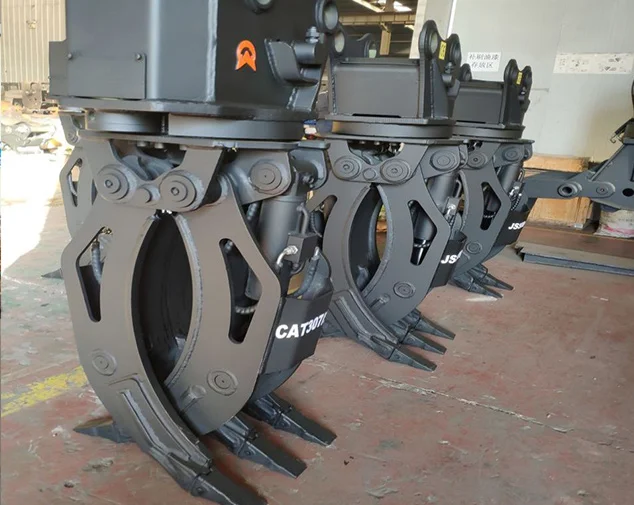Factors Affecting Fuel Consumption in Excavators with Hydraulic Grabs
Cutting down on fuel is a big thing in excavation work these days. Gas prices are sky-high, and folks care a bunch about keeping nature safe. This guide digs into what makes excavators use more or less fuel, from how their hydraulic systems run to engine power, operator skills, and neat new technology. You’ll find out how tools like hydraulic grabs can move stuff easily while saving energy. We’ll also give you simple tricks to use less fuel without slowing down your job. Whether you have one machine or a whole bunch, these tips will help you save money and work in a greener way.
Key Components Influencing Fuel Consumption in Excavators
How Do Hydraulic Systems Affect Fuel Usage?
Hydraulic systems are a huge part of how excavators work. They make the arm, boom, and tools like hydraulic grabs move. When they’re in awesome shape, they run smoothly and save fuel. Good hydraulics don’t waste energy. But leaks or worn-out seals force the engine to work harder. That burns extra fuel. Checking the hydraulic oil and pressure regularly keeps everything running well. It also helps you save fuel.
What Is the Role of Engine Efficiency in Fuel Consumption?
The engine is like the excavator’s heart. A strong engine turns fuel into power without wasting any, so you use less. Modern engines have cool features like turbochargers or smart controls that burn fuel cleanly. This saves money. But if the engine isn’t taken care of—like if filters are clogged or injectors are broken—it uses more fuel because it’s not working right. Keeping the engine in top shape is super important for saving fuel.
Does Excavator Weight and Load Capacity Influence Fuel Use?
Yes, an excavator’s weight matters a lot. Heavy machines need more power to move, especially on bumpy or sloped ground. That burns more fuel. Also, putting too much weight on the machine stresses the engine and hydraulics. This uses extra fuel. Operators should stick to the machine’s weight limits and pick attachments that match its specs. Doing this keeps fuel use low.
How Do Operating Conditions Impact Fuel Efficiency?
The place where you work changes how much fuel your excavator needs. Things like the ground, weather, or how tough the job is make a difference. For example, soft or muddy dirt makes the machine work harder than solid ground. Hot or cold weather can mess with the engine or hydraulic fluid. That changes fuel use. By tweaking how you work based on these conditions, you can save energy.
Understanding the Hydraulic Grab for 5-Ton Excavators
What Are the Features and Benefits of Hydraulic Grabs?
Hydraulic grabs are fantastic tools for moving materials or sorting things. They’re tough and precise, made from strong materials like NM400 steel. These steels can last long. These grabs can spin 360 degrees, which makes them easy to use. Special parts like honing tubes and imported oil seals help them work fast and stay durable. For 5-ton excavators, these grabs are perfect—strong but not too heavy.
Are Hydraulic Grabs Compatible With Various Excavator Models?
Yes, hydraulic grabs fit many excavator models in their weight class. They use standard mounting systems, so they connect easily to different brands. Companies like Kingho offer custom options, too. You can change the grab’s size or shape to fit your job’s needs. This makes them super flexible.
How Do Hydraulic Grabs Enhance Efficiency?
Hydraulic grabs speed up work by making it quicker to grab and move stuff. Their sturdy design means they don’t break down often, so you keep working. The 360-degree spin lets you pick up materials without moving the whole excavator. This saves time and fuel.
For high-quality hydraulic grabs made for 5-ton excavators, check out this product.
Operational Practices to Optimize Fuel Consumption
Why Is Operator Skill Important for Fuel Optimization?
A skilled operator can save a ton of fuel. They know how to run the excavator without pushing it too hard. By avoiding extra moves, keeping idle time short, and picking the right power settings, they cut fuel use. Good training helps operators work smarter and save more fuel.
What Practices Ensure Reduced Fuel Use?
Planning is a big help. Before you start, figure out your tasks to avoid extra moves. Choose the right attachment for the job to work smoothly. Also, keep the engine speed steady instead of revving it up and down a lot. This cuts down on fuel use.
Which Common Mistakes Increase Fuel Consumption?
Mistakes like revving the engine too much or leaving it running when not needed waste fuel. Using old, worn-out attachments also makes the machine work harder. That burns more fuel. Avoiding these slip-ups keeps fuel costs low.
How Does Regular Maintenance Impact Efficiency?
Keeping your excavator in good condition means it runs smoothly and doesn’t waste fuel. Regular checks can discover small problems. So it’s important to check your excavator before the problems turn into big ones, which use more energy. This keeps your machine efficient.
What Are Maintenance Tips for Hydraulic Systems?
Check hydraulic fluid levels and quality often. This stops leaks that waste energy. Look at seals and hoses for cracks or wear to keep the system working well. These steps help save fuel.
Why Is Engine Maintenance Crucial?
A well-maintained engine burns fuel better. Change air filters regularly to keep air flowing into the engine. Make sure the injectors work right to avoid wasting fuel on bad burns. This keeps your excavator running smoothly.
To find awesome tools like hydraulic grabs that boost performance and last long, visit this page.
Technological Advancements in Excavators and Their Impact on Fuel Efficiency
New tech is making excavators way better and more fuel-efficient. These upgrades save cash and help the environment.
Smart Technologies in Modern Excavators
Automated Systems to Reduce Idle Time
Smart systems help excavators save fuel by cutting idle time. They shut off the engine when the machine isn’t in use, so no fuel is wasted. For example, special controls watch how the excavator is working and turn it off during breaks. This saves a bunch of fuel on big jobs.
Monitoring Systems for Real-Time Fuel Tracking
Fuel-tracking tools let operators see how much fuel they’re using right away. These systems show clear numbers, so you can spot issues and fix them fast. Some use GPS to track multiple machines from far away. This helps managers keep fuel costs low across different sites.
Kingho’s Innovations in Hydraulic Grab Technology
Kingho is doing amazing things with hydraulic grabs for 5-ton excavators. Their grabs use strong NM400 steel, which is tough and resists wear. Swiss-made rotary motors let the grabs spin 360 degrees for easy handling. Parts like honing tubes and imported oil seals make them work fast and last long. These features cut downtime and make work more efficient, saving fuel.
Choosing the Right Equipment to Minimize Fuel Costs
Picking the right hydraulic tools is super important for saving fuel and doing great work. The right attachments make your excavator run better without wasting energy.
Factors to Consider When Selecting a Hydraulic Grab
Material Handling Requirements and Grab Size Selection
Think about what you’ll move, like rocks, steel, or wood. Pick a grab size that fits the job. The right size works well without stressing the hydraulic system or burning extra fuel.
Compatibility with 5-Ton Excavators: Kingho’s Recommendations
For 5-ton excavators, you need attachments that fit just right. Kingho’s hydraulic grabs are made for this weight class, so they work smoothly with many brands. Their standard mounting systems make setup quick, and they keep the machine balanced to save fuel.
How Kingho’s Products Stand Out in Reducing Operational Costs
Kingho’s grabs are built with care to fix common problems. They use strong Q345 manganese plate steel and advanced rotation systems, so they last longer and need fewer repairs. The full-angle spin means you don’t have to move the excavator as much, which saves fuel.
For top-notch hydraulic grabs designed for 5-ton excavators, explore this product.
FAQ
Q1: How do automated systems in excavators contribute to fuel savings?
A: Smart systems stop idle time by turning off the engine when it’s not needed. This saves fuel by using energy only when working.
Q2: What makes real-time fuel tracking essential for fleet management?
A: It gives clear fuel-use data. Managers can spot waste and make changes to save fuel across many machines.
Q3: Why is compatibility important when selecting a hydraulic grab?
A: A compatible grab fits your excavator well. It keeps work smooth and avoids extra strain, saving fuel



